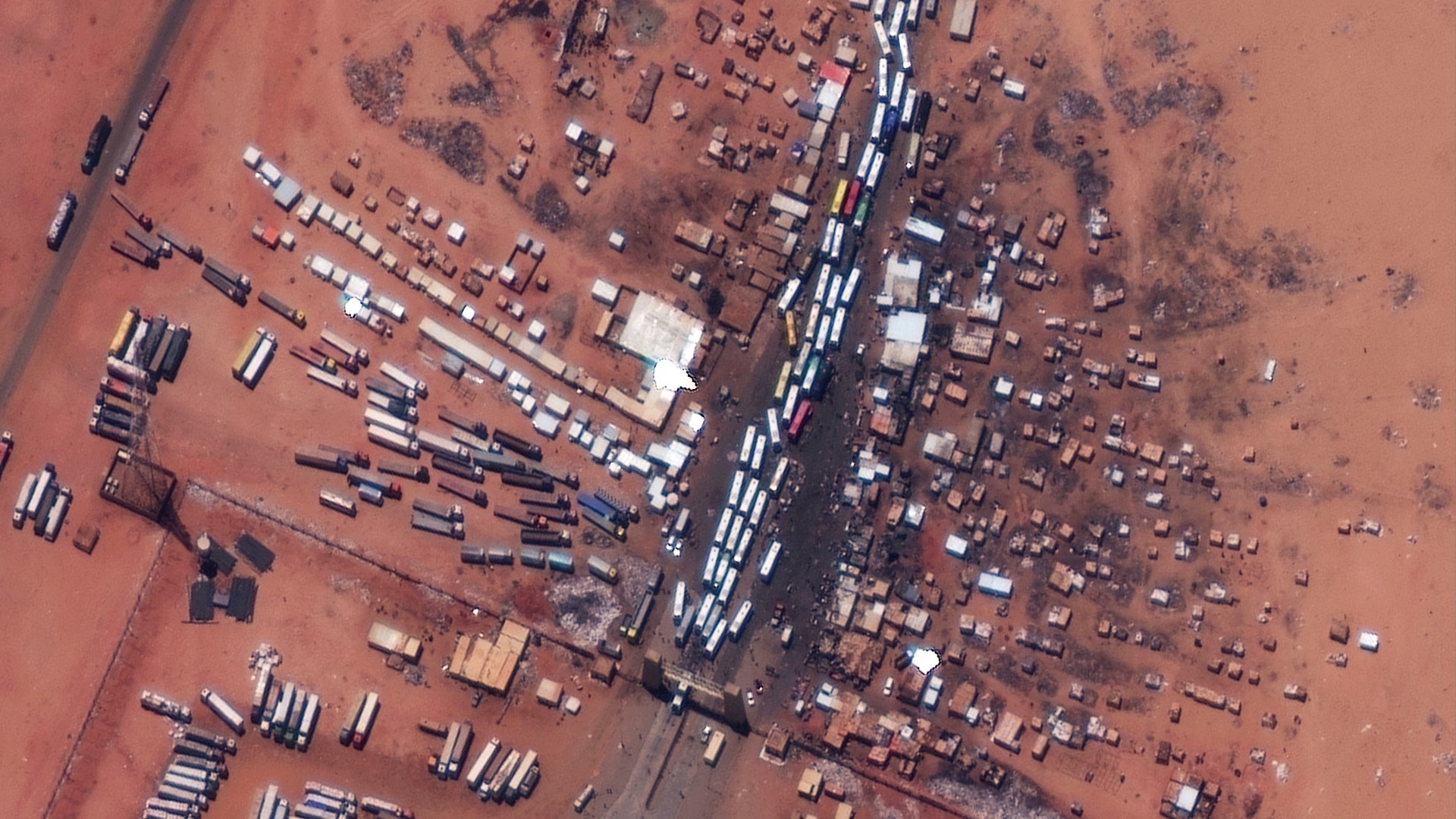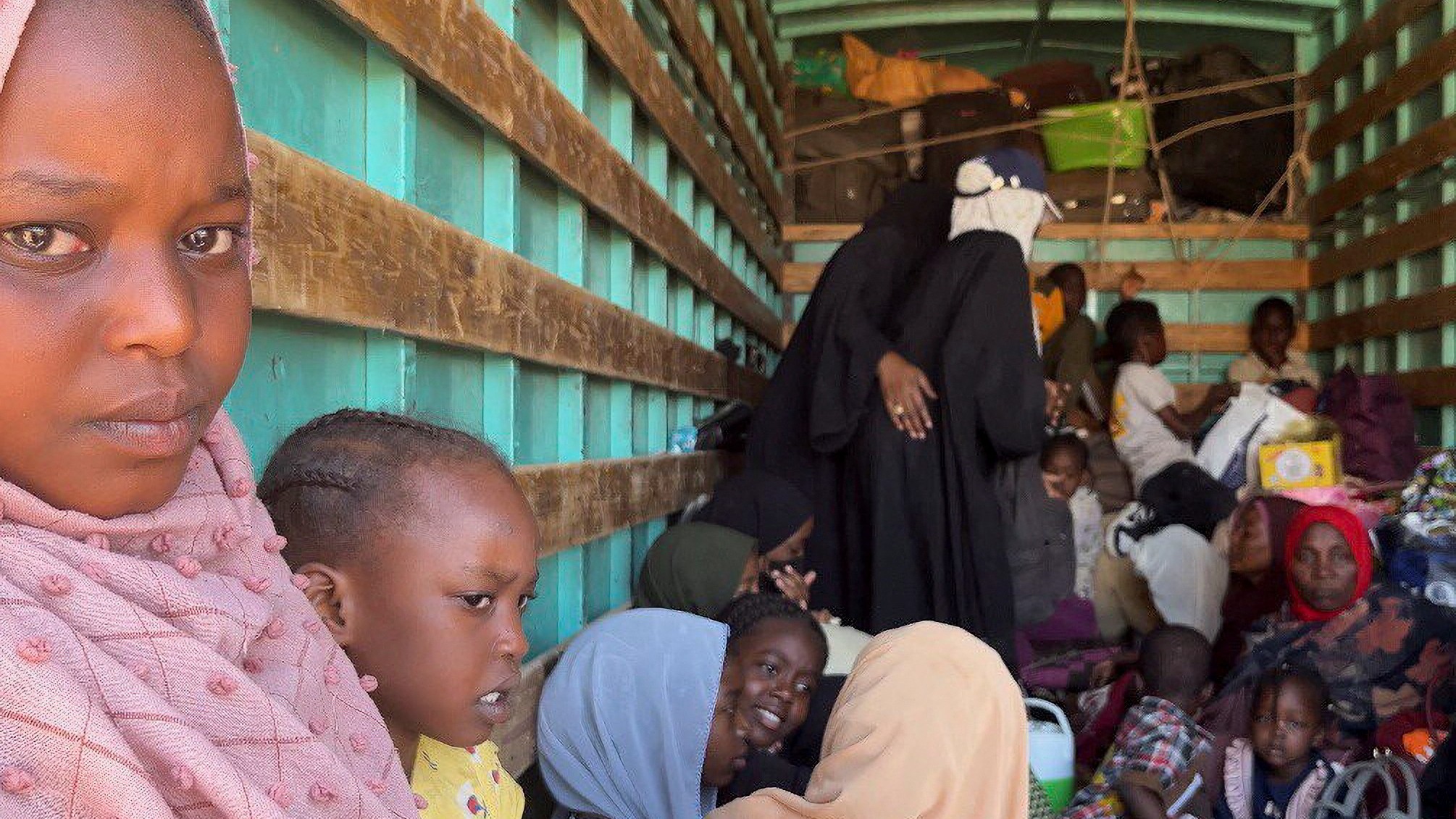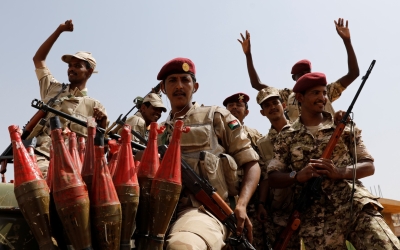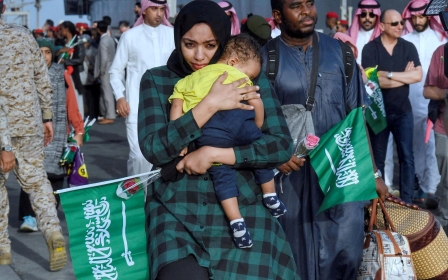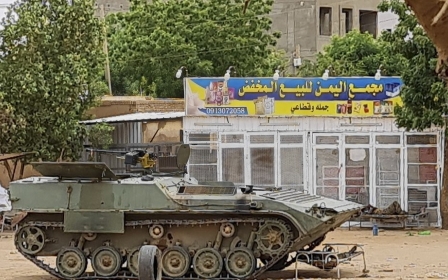Sudanese refugees in Egypt met with extortion, chaos - and kindness
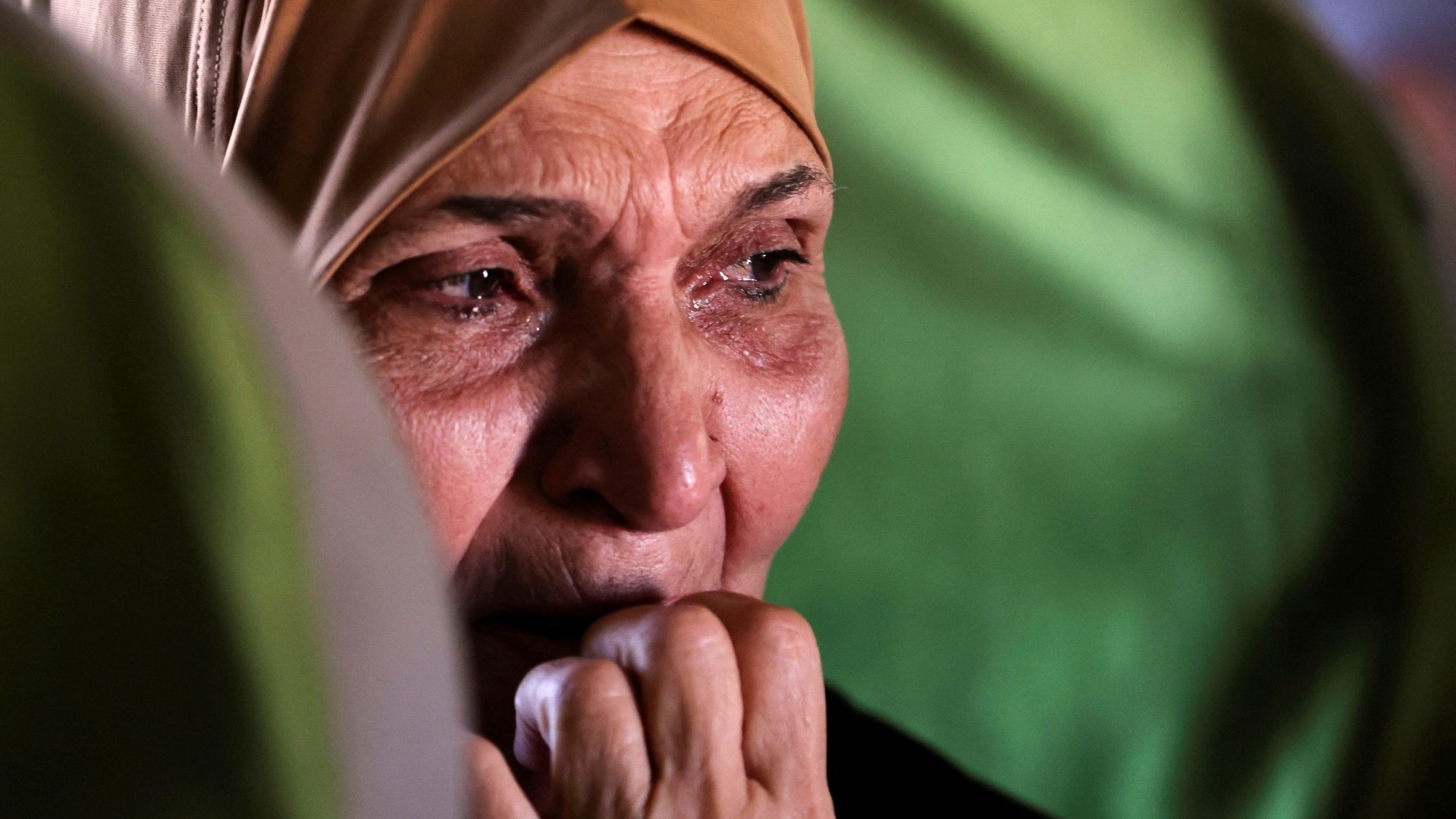
Asmaa al-Tayaeb felt a sense of relief as she approached Egypt. "The bullet sounds stopped when we got close to the border," the 57-year-old Sudanese widow told Middle East Eye in southern Egypt.
Tayaeb fled Omdurman a few days after Sudan erupted into violence, and made her way north with her three children, her mother and her disabled brother, bribing her way past Sudan's warring forces in the process.
Yet she found that experience repeated as she entered Egypt, where police and military personnel are deployed in their hundreds with heavy weapons and armoury.
Since the outbreak of war in Sudan on 15 May, fighting that has killed at least 750 people, the Sudanese-Egyptian border has been chaos. Buses can take days to cross, with Egyptian security forces hauling young men out of vehicles for additional checks and occasionally interrogation.
Meanwhile, police in civilian clothes roam the area and try to mingle among the newly arrived refugees, a tactic used previously during demonstrations.
According to the United Nations' refugee agency UNHCR, more than 56,000 people have crossed from Sudan to Egypt since the fighting began last month, only 1 percent of which are foreign expats.
Several Sudanese refugees told MEE they have been forced to pay countless bribes since crossing into Egypt, and have been subjected to various random checks and other forms of hostile treatment.
After days on desert roads, people complain of a lack of medical care, with refugees (many of which travelled on top of buses and trucks in the baking sun) arriving dehydrated and exhausted.
Youssef al-Moslem, a 57-year-old teacher, arrived in the southern Egyptian city of Aswan in the first days of what he called the “exodus”.
He travelled to the city with his brother and nephew to find housing for the rest of their family, who waited in no man's land until shelter was secured.
'We are not here to play politics or to irritate people. We are literally fleeing for our lives and the lives of our parents'
- Mohamed Imam, refugee
“In the first days, the border only allowed hundreds through every day. And we had to stay around two days in the buses until we were allowed past," he told MEE as he arrived back at the border from Aswan to welcome the rest of his family.
"In the later weeks, entry became smoother and members of the Red Crescent were all over the border helping.”
Yet the Red Crescent medical teams are overrun, treating hundreds of women and children. The Egyptian health ministry has provided just two ambulances.
“Dozens of the children and women come sick with low blood sugar, dehydration, sun stroke, or exhaustion," a doctor working with one of the ambulances told MEE.
"Yet we as employees of the health ministry don’t have enough equipment to cover all these cases."
The doctor said that the medics and other volunteers from Aswan had begun collecting money to try and purchase the equipment they need.
"We have provided sanitary products for women, baby formula, minerals, vitamins, water, juice, sweets, painkillers, insulin, fever medication and others,” she said, adding that other unorganised volunteers buy and distribute phone credit charging cards to refugees so they can either call their families back in Sudan or register for refugee status with the UNCHR.
However, the doctor warned that the medical situation could deteriorate rapidly if the Egyptian government continues to take a back seat.
Egyptian border guards seem keen to identify any Sudanese that have been part of their country's widespread pro-democracy movement, which helped topple longtime autocrat Omar al-Bashir in 2019. They are also on the lookout for Islamists, fearing they could be connected to the outlawed Muslim Brotherhood opposition group.
Mohamed Imam, a 20-year-old engineering student, said officers detained him for six hours. He waited for them to finish dinner and watch a Premier League football match before interrogating him.
“They asked me whether I am an Islamist and whether I joined the protests in 2019 and 2020, and demanded that I show them my Facebook and Twitter accounts,” he said.
Imam and two other young men told MEE that the officers asked them to inform on any other Sudanese who might be affiliated with the country’s Islamists or who are members of youth leftist groups.
“We are not here to play politics or to irritate people. We are literally fleeing for our lives and the lives of our parents… the military and the militias are playing a game and we are outside the pitch,” Imam said.
Dozens of Sudanese, including families, were being detained as he left, Imam said.
Rising demand
Where domestic and international authorities have been absent, local initiatives and social media campaigns have filled in, mobilising to provide support and assistance to the thousands in need.
However, there are limits to what NGOs and individuals can achieve amid the chaos and lack of coordination from the Egyptian government.
In addition to the Egyptian Red Crescent, other NGOs and UN agencies continue to provide relief items and lifesaving support such as food, water, hygiene kits, transportation and medical assistance.
Fleeing Sudan is expensive, and the trip to Aswan costs around $500. Costs are skyrockting in Egypt too. A hotel in Aswan is now around $180 a night.
A hotel worker in a two-star hotel told MEE that “the room which used to cost 300 Egyptian pounds [$10] per night, now costs $100 per night. In the four and five star [hotels], prices are now $150 and $180.”
MEE contacted three four-star hotels to ask about rooms, and staff asked for the nationality “as rooms for foreigners are now in more demand so they are higher in price”.
Moslem, the Sudanese teacher, said prices on goods and essentials should be monitored by authorities as they skyrocket.
“Some of the Aswan residents welcomed us with open arms, but others want to take advantage of the situation," he said.
While Moslem and his family were able to secure a moderately priced two storey house, others are struggling to find decent accommodation in the already stretched economy of Aswan.
Naema Saqr, a 29-year-old physiotherapist who left Sudan with her family, said her house was used by the Sudanese army to attack RSF fighters. Once they reached Egypt, finding safe haven proved difficult there as well.
“All of my children and nieces are traumatised, and we spent one night in the street because we couldn't find a flat," she explained.
Eventually, Saqr was able to find shelter in the village of Abu Simbel. She is committed to continuing her journey north to Cairo, where she hopes to continue her career.
“Sleeping on concrete in Aswan is better than not sleeping all night from the gunshots," she said.
Looking for work
Sudanese without the funds needed to pay these exhorbitant prices have been forced to work the moment they entered Egypt.
Hamdi al-Zawawi, 30, and four of his cousins found a construction job that pays them 200 Egyptian pounds a day, which is around $6.
“We spent all the money we had on the trip from Khartoum to Hafla, and then to Aswan. Each of us paid $600,” Zawawi told MEE.
“We saw horrible things coming out of Khartoum … It's a shame. It was a beautiful city despite all the difficulties. On the road, you see bodies lying in the street and soldiers looting the bodies."
Salama, a street vendor who has just arrived with her family, lost her brother in the fighting.
“We don’t know where to go or where we will be next week,” she told MEE. “We don’t know whether to grieve the dead or our future.”
Despite the bleak images at the border and the days of uncertainty, some refugees have praised the welcome they received from Aswan's residents.
Mofeed Gonbalan, a 34-year-old newlywed engineer, arrived at the border last week with his family, and was offered a flat by a stranger in the nearby village of Daraw.
Certainly, the welcome in Daraw seems warm: MEE witnessed around a 100 Sudanese refugees greeted by the village's residents as they arrived on three buses.
Sami al-Khateeb, a Daraw resident and an owner of a grocery shop, told MEE that there was a "historic bond between all of Sudan and Aswan, whether it is by blood, marriage, business or solidarity”.
“The whole village gathered after the Friday prayer to celebrate and welcome our Sudanese brothers and sisters. Whoever has a piece of bread, they will divide it between him and his Sudanese brother.”
Middle East Eye propose une couverture et une analyse indépendantes et incomparables du Moyen-Orient, de l’Afrique du Nord et d’autres régions du monde. Pour en savoir plus sur la reprise de ce contenu et les frais qui s’appliquent, veuillez remplir ce formulaire [en anglais]. Pour en savoir plus sur MEE, cliquez ici [en anglais].


